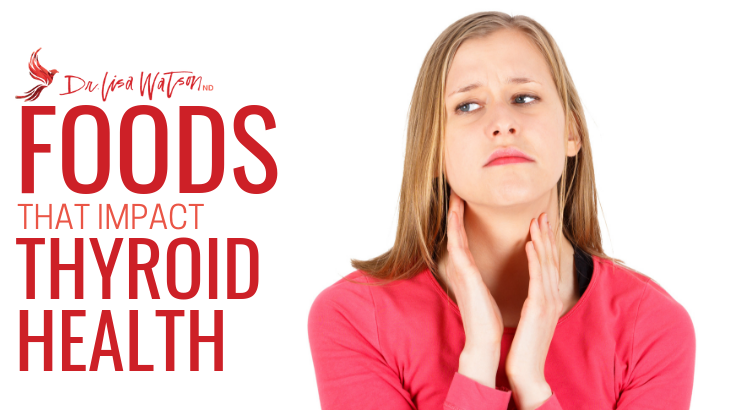
Hypothyroidism is one of the most common hormone imbalances affecting women today. Thousands of women are diagnosed with low thyroid function every year, and it is estimated that there are thousands more who go undiagnosed.
The chances of developing hypothyroidism are increased during pregnancy, after pregnancy and as we age, with rates of diagnosis highest in women aged 40-60.
An imbalanced thyroid can leave you feeling exhausted, unmotivated and unhealthy. The symptoms of hypothyroidism vary but can include:
If you suspect you may have low thyroid function you should see your Medical Doctor or Naturopathic Doctor to have thyroid function testing done. Discuss your results with your doctor because even mild disturbances in thyroid functioning can have significant impacts on your quality of life.
Foods that Impact Thyroid Health
“Let food be thy medicine and medicine by thy food” – Hippocrates
What we eat can impact our thyroid health in both positive and negative ways. Learn which foods support healthy thyroid functioning and which ones can interfere with thyroid health.
See if you know which foods are good for your thyroid and which ones are bad.
Pumpkin Seeds – GOOD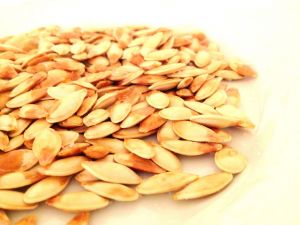
Pumpkin seeds are a source of tyrosine, an amino acid our body uses to manufacture thyroid hormone. If we don’t get enough tyrosine in our diet hypothyroidism can develop.
Other food sources of tyrosine: almonds, avocados, bananas, plain natural yogurt, sesame seeds (including tahini), lima beans
Seaweed – GOOD
Seaweeds are a rich source of iodine, a mineral necessary for production of thyroid hormones. Iodine combines with tyrosine to produce thyroid hormones. A diet deficient in iodine is the most common cause of hypothyroidism worldwide.
Other food sources of iodine: table salt, fish (sea bass, cod, haddock), shellfish and sea vegetables including seaweed (Nori, Wakame, Arame, Dulse) and kelp.
Brussels Sprouts – BAD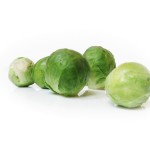
Brussels sprouts are members of the Brassica family of vegetables. This family of vegetables can have goitrogenic effects – they can induce an iodine deficiency by combining with iodine and making it unavailable to produce thyroid hormone.
Cooking the Brassia family of vegetables can lessen their harmful impact on the thyroid – and if your diet is rich in iodine they are unlikely to have a significant impact.
Other Brassica vegetables: cabbage, turnips, Brussels sprouts, kale, mustard greens, radishes, horseradish, rutabaga, broccoli, cauliflower, bok choy)
Peanuts – BAD
Peanuts also have goitrogenic effects, similar to the Brassica family of vegetables. Other foods that have this effect are: millet, cassava and pine nuts.
Mushrooms – GOOD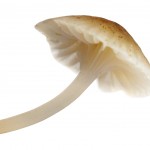
Mushrooms are a source of selenium which is needed for the conversion of T4 to T3 (active thyroid hormone) in the body. People with low intake of selenium may have high levels of T4 and TSH but low levels of T3, resulting in symptoms of hypothyroidism. Selenium deficiency can also lead to elevations in thyroid antibody levels.
Selenium content of food depends on the selenium-richness of the soil that the food is grown in. Southern Ontario soil tends to be low in selenium. It is estimated that selenium is deficient in about 50% of diets.
Other food sources of selenium: brown rice, oats, Brazil nuts, shellfish, garlic, onions, broccoli, tomato, radishes
Soy – BAD
The main isoflavone in soy – genistein – is goitrogenic – it can bind to iodine and make it unavailable to the thyroid for thyroid hormone production.
If you have an underactive thyroid gland you do not need to completely avoid all soy products – but you do need to make sure you are getting enough iodine to counter any negative impacts from soy consumption.
Wheat – May be BAD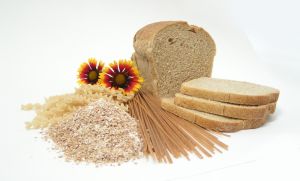
If you are sensitive to wheat, dairy or any other food avoiding these foods is important for maintaining thyroid health. Individuals with autoimmune thyroid disease are more susceptible to food sensitivities or allergies.
Because many people do harbour food sensitivities to wheat, dairy and other foods, an elimination diet or food sensitivity test may be useful to determine sensitivities and restore balance to the immune system and thyroid gland.
Hormone imbalances like hypothyroidism respond best to an integrative approach to treatment. Dietary changes, like those discussed here, in combination with lifestyle changes, supplements, and medications where necessary can improve your condition and your quality of life. It’s all about finding that perfect balance for you, and your health.
Disclaimer
The advice provided in this article is for informational purposes only. It is meant to augment and not replace consultation with a licensed health care provider. Consultation with a Naturopathic Doctor or other primary care provider is recommended for anyone suffering from a health problem.




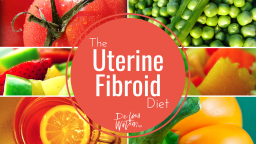

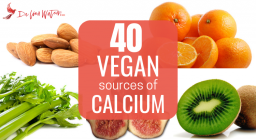



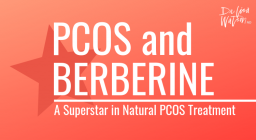
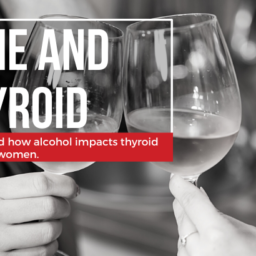


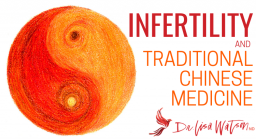


Hi i,ve been told that brocolli is not good for hypothyroid. And pumpkinseeds as well .feeling confused. Plz confirm. Thkx
Broccoli is a brassica vegetable (along with cabbage, cauliflower and others). Brassica vegetables are ‘goitrogens’ – they can induce an iodine deficiency by binding to iodine and making it unavailable to thyroid. Iodine is a necessary component of thyroid hormone.
Cooking these vegetables before eating them will limit their impact on thyroid health.
~Lisa
Lisa Watson thank you to listen to my reply my tsh level is 12 0.89 is the bottom number they say I have hypothyroidism what can I do about it to make it normal
You need to understand WHY your thyroid is under functioning. Is it autoimmune (Hashimoto’s) or from another cause? You may need thyroid medication to restore balance, or desiccated thyroid, or perhaps just nutritional supplements. Seek out a Naturopath in your area to get a personalized approach. ~Dr. Lisa
Thanks for this informative post!
A question please: broccoli was listed in (Brassica vegetables) as bad for hypothyroidism, and good in (food sources of selenium). So is it good or not because I eat it as soup frequently.
Thanks a lot.
Raw brassica vegetables (like broccoli) are the problem. Once you cook them they are no longer a concern. So your broccoli soup will be a-ok!
~Dr. Lisa
Thanks Dr. Lisa!
What about the phytoestrogens in sesame seeds that inhibit thyroid function? I’m getting conflicting information.
Thanks for your question. Sesame seeds are a rich source of selenium – one of the most important nutrients for thyroid health.
I’ve never seen any research that suggests that sesame seeds can negatively impact thyroid health, even with their rich lignan content. The phytoestrogenic properties of sesame are still being researched and most of the research I’ve seen is positive – but is in post-menopausal women. https://pubmed.ncbi.nlm.nih.gov/16614415/
Best,
Dr. Lisa